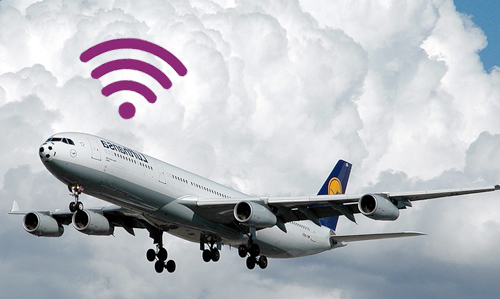In-Flight Wi-Fi have been great news to customers as its allow them to stay connected during the journey. Airlines know that passengers expect a wireless connection, and they are eager to offer it. Furthermore, the Airlines also benefit by offering this service. There are two main benefits to an airline.
1. In-flight advertising and shopping promotions.
One of the best ways to advertise to people is through in-flight advertising where flight passengers are a captive audience and cannot just get up and walk away. Some of the ads are more traditional whereas some of them are involves high technology such as touch screens and interactive ads. This is very convenient for advertisers as they can target specific audiences and reach millions of people on thousands of flights everyday. However, passengers can get tired and annoyed of the constant in flight ads and announcements.
According to Chaffey and Smith (2008) a key success factor to achieve main digital marketing objectives is to provide customer satisfaction through the electronic channel. Mike Flores, president of U.S. Airways, states, “A lot of passengers complain about it because they don’t want to listen to ads in flight”.
The growing availability and popularity of in-flight Wi-Fi, it is attracting significant attention from marketers, who are looking to reach this captive audience with shopping promotions and advertising.

The negative attitude towards advertising in-flight could be reduced by offering in-flight wifi service for free. By offering these service marketers can sneak in advertising whereas maintaining customers happy with the free service. During the 2009 holiday season Delta Airlines partnered with Ebay and gave passengers on nearly 300 airplanes free access to wifi during their flights for seven days beginning November 24. Passengers were given a promotional code that takes them directly to Ebay’s Holiday homepage which featured daily deals and advertisements for various brands and partners of Ebay.
This was a great way for not only Delta and Ebay to advertise, but also for all the other brands featured on the Ebay homepage. This idea was especially successful because it was implemented during the holiday season, which is one of the busiest travel periods and shopping times of the year. In addition, some airlines use Wireless Networks to Replace the Seat-Back Catalog
2. Data mining.
Data mining and other forms of analysis are the key to a firm’s ability to target its customers and prospects based on their lifetime value to the firm as well as the basis for identifying and meeting the customer’s needs and wants.
The technology benefits marketing by making tacit knowledge more accessible. Some of the most important knowledge about customers is tacit knowledge, such as their shopping patterns, interest and activities profiles, payment transactions and chatroom discussions. (Wind and Mahajan, 2002)
The opportunities created by mobile data mining can change the way airlines market and advertise their services. Airlines could install and exploit WiFi infrastructure for customer insight that helps to personalize the flying experience and develop better target promotions. For example, on some airlines, flight attendants carrying tablet computers will soon have far more data on fliers at their fingertips, including their allergies, seat preferences and whether the carrier lost both their bags last trip.
Furthermore, airlines’ marketing pitches are also becoming more relevant, in part based on customers’ online-browsing history, their likes on Facebook and their income. Thomas Davenport, a Babson College professor who has studied how airlines use data, says such systems will help carriers make strides in onboard revenue, an area where they have long missed the opportunity presented by bored, typically affluent buyers trapped in one place for several hours.
As it can be seen, Wi-Fi in-flight can benefit not only the passengers but also the company. However, is important to take into account that offering WIFI for free could be costly, According to Ryanair CEO Michael O’Leary, these cost involves expensive roaming charges and a physical weight cost which adds to the airline fuel bill (Read More).
On an interview to it was asked to Tony Tyler, Director General and CEO of IATA, whether he believed airlines should offer free Wi-Fi on board to passengers, and that was when Tyler’s forward-thinking moment passed. “No,” he replied (Read More). Furthermore, Infrastructure to provide Wi-Fi on aircraft, is much more complicated than infrastructure to provide Wi-Fi in airport terminals.
References
Chaffey, D. and Smith, P. (2008). EMarketing eXcellence. Amsterdam: Butterworth-Heinemann.
Wind, J. and Mahajan, V. (2002). Digital Marketing. Symphonya. Emerging Issues in Management, (1).
